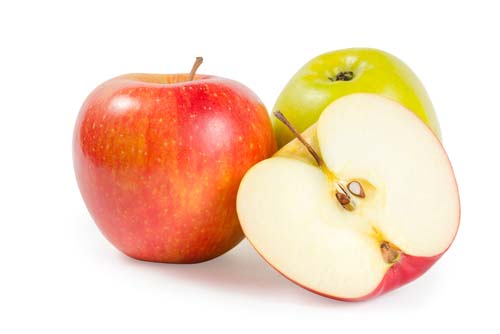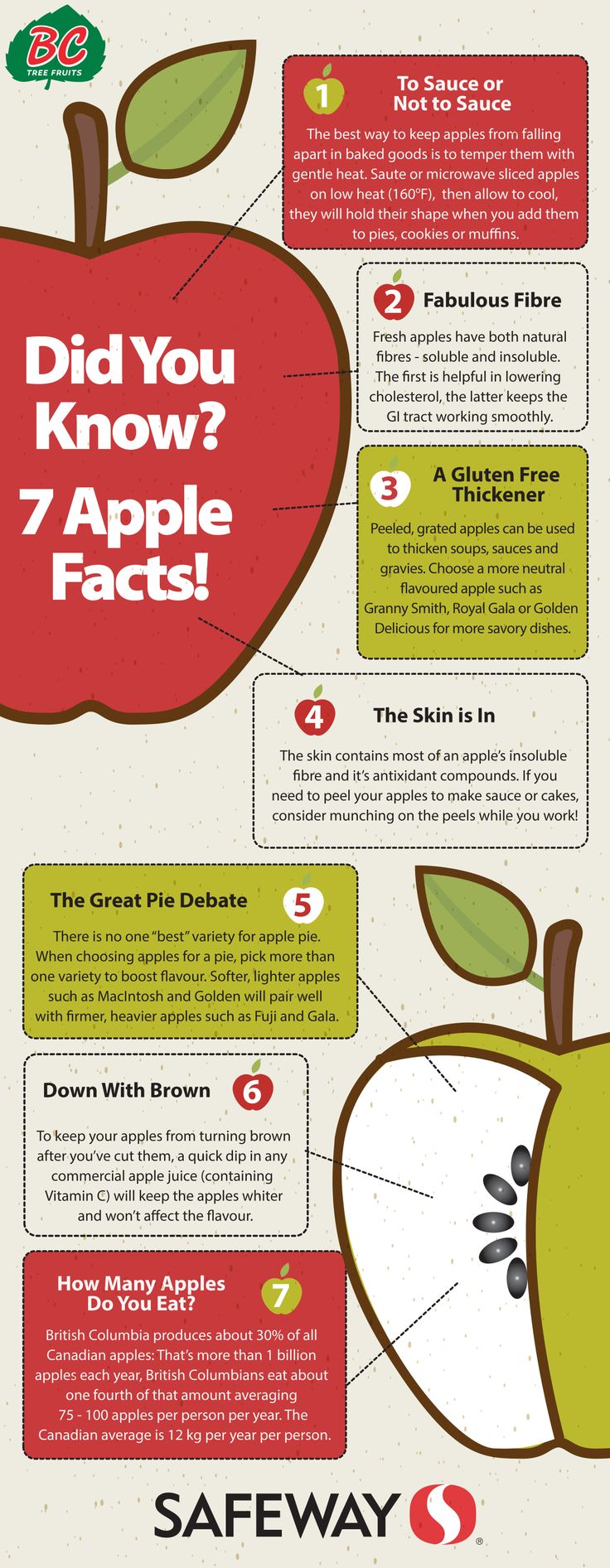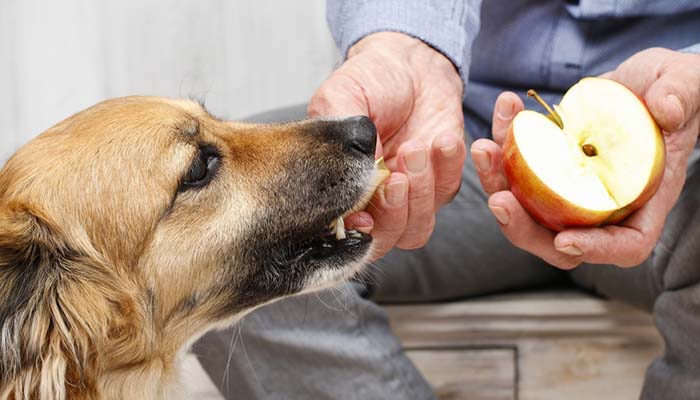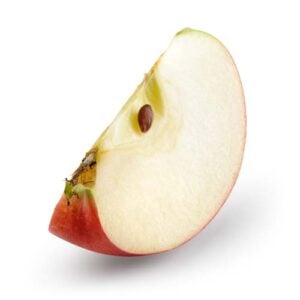Long considered a healthy food, apples provide a multitude of nutritional value to people. But can dogs eat apples as well, and are apples for dogs safe to consume? What are the health benefits of feeding apples to dogs, and are there any side effects? Let's take a closer look at this popular fruit.
If you've been wondering, “can I give my dog apples,” the answer is YES – you can give your dog apples and they're not toxic to dogs. Apples are packed with nutrition and tons of antioxidants, all of which is beneficial to dogs.
Will an apple a day keep a doctor veterinarian away? Actually, it just might.
Apples often make a great treat for dogs, and they're a common food to add to homemade dog food meals. When given in moderation, they're a great addition to any dog's diet. Let's see why giving apples to dogs is a good idea and how they impact health.
Table of Contents
RECIPE: Natural Apple Pupcake Dog Treats
What are apples?
The apple is one of the most popular fruits most widely grown in the species called Malus. There are over 2,000 apple varieties that range in flavor from juicy to sweet to tart, and they are renowned for the many health benefits they provide people and animals.
The reason this sweet fruit is so common is because apples are exceptionally packed with antioxidants and they're one of the most studied foods out there. Below I'll list all the evidence-based health benefits of apples for dogs and people so you both can enjoy them.
This is what fresh raw apples look like:

Compared to many other fruits, apples are lower in calories and natural sugar content. They are high in fiber, vitamins and antioxidants. On top of that, apples taste delicious to dogs and most dogs love apples whether raw, cooked or used in homemade dog food.
Let's take a look at all the benefits of apples for dogs and potential side effects.
ALSO READ: Can Dogs Eat Bananas?
Apples for Dogs 101
Can Dogs Eat Apples?
 So, can dogs eat apples just as humans can? Yes, indeed – apples are safe for dogs to eat when given in moderation. In fact, if you cook for your dogs, it's even recommended to add apples to your dog's diet to increase nutrient content of your pet's meals.
So, can dogs eat apples just as humans can? Yes, indeed – apples are safe for dogs to eat when given in moderation. In fact, if you cook for your dogs, it's even recommended to add apples to your dog's diet to increase nutrient content of your pet's meals.
Apples are considered a “superfruit,” and there's a lot of research behind them providing tons of health benefits of apples for dogs and humans. I'll do a quick evidence-based breakdown below.
Apples are chock-full of nutrition, vitamins and minerals, and here are the main suspects:
- Vitamin A
- Vitamin C
- Vitamin K
- Calcium
- Potassium
- Fiber
- Omega-3 and Omega-6 fatty acids
- Antioxidants
Out of all these, apples are mostly well-known for their Vitamin C and Potassium content. On top of that, just like giving raspberries to dogs, fresh raw apples also contain and provide canines with a few very powerful compounds:
- Catechin, which may improve muscle and brain function in dogs (1, 2)
- Quercetin, which fights cancer, inflammation, depression and viruses (3, 4, 5)
- Chlorogenic Acid, which lowers blood sugar and helps with weight loss (6)
This superfruit is so powerful that it has become one of the most well-studied fruits, with tons of proven health benefits for people and animals. It's also very likely that dogs can absorb most of these nutrients from eating apples just as people can.
Unlike many other fruits, there's tons of animal studies on apples, which makes it much easier to understand how apples for dogs may be beneficial. Below is a brief science-based breakdown of all potential health benefits of apples for dogs and people:
- Apples lower cholesterol, risk of stroke and improve heart health (7, 8, 9)
- Apples are extremely beneficial for weight loss (10, 11, 12)
- Apples may promote healthy gut bacteria (13)
- Apples lower the risk of diabetes (14, 15)
- Apples relieve asthma and related allergic reactions (15, 16)
- Apples may lower the risk of cancer (17, 18)
- Apples improve bone health (19)
- Apples may protect the brain from the old age (15, 20)
- Apples may protect the stomach from NSAID side effects (15)
And that's just briefly covering the most well-known research, with a lot more studies on apples left behind. As you can see, evidence is clear that apples for dogs and people are not only safe but definitely recommended and provide a ton of health benefits.
Now let's talk about some specific examples of why not only dogs can eat apples but why giving an apple to a dog as an occasional treat may be a great idea.
READ: Can Dogs Eat Watermelons?
8 Potential Benefits of Apples for Dogs

Not only apples for dogs are safe to consume, but if you give your dog an apple as a treat or include apples in your homemade dog food recipes, there are some health benefits your pet will reap from regularly consuming this superfruit (in moderation).
Here are the eight most prominent benefits of giving apples to dogs:
1. Vitamin A promotes eye health.
Vitamin A in apples promotes overall eye health in dogs and strengthens your dog’s vision. This vitamin may also help keep your dog’s bones, skin, and coat healthy and many other important body functions.
2. Antioxidants in apples may prevent diseases and cancer.
Apples are one of the best foods that contains large amounts of antioxidants, in particular, Vitamin C which may have cancer-shielding properties. As research that I've listed above shows, it's clear that feeding apples may prevent cancer and fight inflammation.
Vitamin C that's plentiful in apples promotes cartilage and collagen synthesis, strengthens a dog’s immune system, and combats many degenerative conditions like hip dysplasia.
3. Vitamin K improves dog's heart, blood, bone, and liver health.
Apples have a hefty dose of Vitamin K, an essential mineral that improves a dog’s blood health and liver. Research with animal and human studies have clearly shown that apples in the diet may improve all of these organs and their function.
Vitamin K specifically may also have a positive impact on the prevention and management of dog's bone and heart related diseases. It also strengthens a dog’s bones and teeth.
4. Apples have calcium, an essential mineral for vital body functions.
Calcium is crucial to your dog’s body functions, especially muscle contraction, nerve impulse transmission, blood coagulation, and bone formation and development. Apples are full of calcium and evidence shows that they can improve all of the above factors.
5. Dietary fiber helps to regulate the digestive system.
Another thing that apples are known for is fiber. Dietary fiber regulates bowel movements in dogs, encourages weight loss, and improves digestion in general. Additionally, fiber helps prevent flatulence, constipation, and diarrhea in canines.
6. Essential fatty acids keep your dog’s skin healthy.
Although they're not known for this, but apples have Omega-3 and Omega-6 essential fatty acids that may improve dog's heart, brain and ski. Essential fatty acids keep a dog’s coat shiny and may prevent skin allergies as well as many other vital body functions.
7. Apples have antioxidants that strengthen multiple body systems.
The antioxidants in apples may improve the function of the gastrointestinal system in dogs, bone growth, eye health, skin and coat, and the canine's immune system.
Antioxidants are also known to prevent inflammation, several diseases and illnesses as well as fight cancer and viruses.
8. Apples provide dental benefits for dogs.
This has not been proven, but theoretically, apples not only strengthen dog's bone and teeth, but also provide a dog with a natural means of brushing and cleaning his teeth. The apples help remove plaque and tartar, which in turn helps freshen a dog’s breath.

“So, can I give my dog apples?”
Yes, you most certainly can give your dog apples and there's a good reason to do so. Apples for dogs are completely safe when given in moderation as a treat or added to their homemade dog food dishes.
Not only that, but science shows that it would be a good idea to deliberately start giving your dog apples, particularly if he enjoys the taste of apples. You can significantly improve your dog's health with this natural superfruit.
Is apple skin safe for dogs?
Yes, when given in moderation, you can also feed apple skin to dogs. It's safe provided that the first few times you give it to dogs you monitor them and how they eat it.
In fact, apple skin has the highest concentration of fiber when it comes to the benefits of apples for dogs. It also packs a ton of nutrients and vitamins that are attributed to apples, thus it would definitely be a good idea to give your dog apples with skin on them.
The Bottom Line: Apples are not only safe for dogs to eat, but they are a very highly nutritious and beneficial treat for dogs. Make sure to always feed them in moderation.
RELATED: Can Dogs Eat Bell Peppers?
1 Potential Side Effect of Apples for Dogs

Giving apples to dogs is generally completely safe and is even recommended. However, as with most other foods, too much of a good thing may not be such a great idea. Thus, there's just one side effects of apples for dogs you may need to watch out for.
1. Too many apples may cause digestive issues.
Despite their nutritional value and potential health benefits for canines, too many apples can cause your dog some gastrointestinal discomfort, mostly due to fiber content.
Constipation, diarrhea, and stomach pains may result if your dog ingests too many apples in one sitting, which is why it's important to start gradually and monitor your pet.
More on Apples for Dogs
3 Safety Precautions
 Apples themselves are safe, healthy and beneficial for dogs. Even apple skin is good for dogs and recommended to be fed alongside apples. However, there are a few things that apples contain that you need to keep in mind and watch out for.
Apples themselves are safe, healthy and beneficial for dogs. Even apple skin is good for dogs and recommended to be fed alongside apples. However, there are a few things that apples contain that you need to keep in mind and watch out for.
Here are the three safety precautions to take when feeding apples to dogs:
1. Remove the core and seeds from apples before feeding them to your dog.
An apple core itself poses a significant choking hazard to dogs, so avoid feeding the core to your canine at all costs. This means don't give whole apples to your dog; cut them up.
Apple seeds may also be dangerous to dogs. All apple seeds must be removed from the apple before you feed it to your dog. These seeds have harmful traces of cyanide in them, and if your dog eats a large amount of them, cyanide can build up within the dog’s body.
2. Don’t feed your dog dehydrated apples.
All the research on the health benefits of apples for dogs is related to fresh, raw apples.
Dehydrated apples are lacking in water which is essential for proper digestion. Stomach upset and other digestive issues may occur if your dog eats dehydrated apples. Moreover, dehydrated apples haven't been well-studied yet so there may be other risks too.
3. Wash apples thoroughly and consider organic to avoid pesticides.
Apples are among the fruits and vegetables considered most contaminated by pesticides. To avoid possible pesticide contamination, consider giving your dog organic apples as treats and always make sure to thoroughly wash all fruits you give your dog.
Summary:
Can My Dog Eat Apples?
 Yes, dogs can eat apples with no issues and it's even recommended to give your dog apples, skin an all. Apples are a fantastic fruit treat to offer to your dog in moderation.
Yes, dogs can eat apples with no issues and it's even recommended to give your dog apples, skin an all. Apples are a fantastic fruit treat to offer to your dog in moderation.
Apples are one of the most well-studied superfruits that is chock-full of healthy vitamins, minerals, and nutrients that promote the overall well-being of your dog.
This fruit may help prevent diseases and cancers in dogs, fight inflammation and viruses, improve eye health, support digestive health, and encourage heart, liver, and bone health.
As with all foods, remember to feed apples to dogs in moderation so your canine gets the most benefit out of this super food without any of the side effects and digestive issues.
References
READ NEXT: 11 Best Superfoods for Dogs That May Improve Their Health













